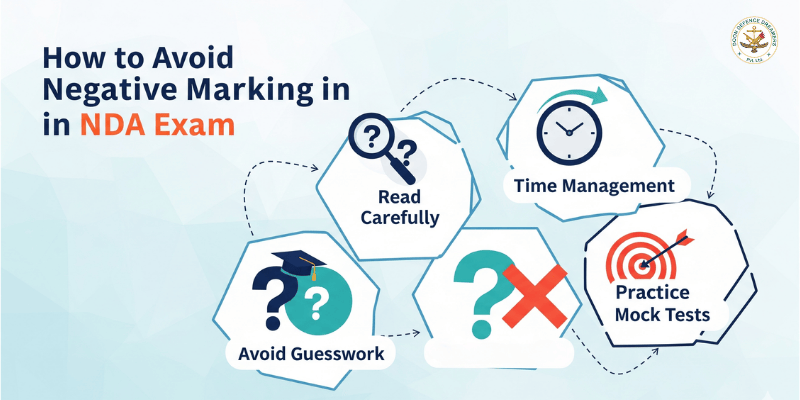The National Defence Academy (NDA) exam is a highly competitive examination that requires thorough preparation and strategic answering techniques. One crucial aspect of the NDA exam is avoiding negative marking, as it can significantly impact your overall score. In this article, we will provide you with valuable tips and strategies on how to avoid negative marking in the NDA exam, enabling you to maximize your chances of success.
1. Understand the Marking Scheme:
Before diving into the preparation, it is essential to thoroughly understand the marking scheme of the NDA exam. The NDA exam follows a penalty-based negative marking system, where incorrect answers result in the deduction of 1/3rd or 0.33 marks from the total score.
2. Be Thorough with the Syllabus:
To avoid negative marking, ensure that you have a complete understanding of the NDA exam syllabus. Study the topics comprehensively and focus on strengthening your knowledge and skills in each subject, including mathematics, English, and general knowledge.
3. Time Management:
Time management plays a crucial role in avoiding negative marking. Use your time wisely and allocate the appropriate time for each section of the exam. Avoid spending too much time on a single question, as it may lead to rushed and inaccurate answers.
4. Read the Questions Carefully:
Carefully read each question and its options before attempting an answer. Sometimes, questions may contain hidden clues or keywords that can guide you towards the correct answer. Pay close attention to the language, context, and nuances within the question to avoid any misinterpretations.
5. Eliminate Incorrect Options:
If you are unsure about an answer, try to eliminate the obviously incorrect options. By using the process of elimination, you can narrow down the choices and increase your chances of selecting the correct option.
6. Don’t Make Assumptions:
Avoid making assumptions or taking wild guesses in the NDA exam. Base your answers on your knowledge and logical reasoning rather than random guessing. Remember that negative marking can significantly reduce your overall score, so it’s better to leave a question unanswered if you are unsure.
7. Practice Mock Tests and Previous Year Papers:
Practice is key to avoiding negative marking. Solve numerous mock tests and previous year question papers to familiarize yourself with the exam pattern, difficulty level, and the type of questions asked. This will help you develop a better understanding of the exam and improve your accuracy.
8. Maintain Calm and Confidence:
During the exam, it’s crucial to stay calm and confident. Avoid unnecessary stress and panic, as it can cloud your judgment and lead to hasty and incorrect answers. Take deep breaths, manage your time effectively, and approach each question with a clear and composed mind.
9. Revise and Review:
After attempting the questions, if time permits, go through your answers and review them. Double-check your calculations, reasoning, and ensure that you have marked the correct options. This revision can help you identify any potential mistakes or errors that can be rectified, thus avoiding negative marking.
10. Seek Guidance from Experts:
If you are facing difficulties in understanding certain topics or have doubts about the exam pattern, seek guidance from experienced mentors, teachers, or coaching institutes. They can provide valuable insights, tips, and tricks to avoid negative marking and improve your overall performance.
Doon Defence Dreamers: Helping Aspirants Succeed
One institute that has consistently guided NDA aspirants to success is Doon Defence Dreamers, based in Dehradun. With a team of experienced teachers and ex-defence officers, they offer:
-
NDA Foundation Course
-
NDA Regular Course
-
CDS and AFCAT Preparation
-
SSB Interview Guidance
-
Physical Training Programs
-
Personality Development Sessions
Over the years, Doon Defence Dreamers has produced hundreds of successful candidates who cleared the NDA written exam and SSB interview. Their regular mock tests, doubt-clearing sessions, and focus on accuracy help students minimize mistakes and perform confidently in the real exam.
Conclusion
Avoiding negative marking in the NDA exam is crucial for securing a good score. By understanding the marking scheme, being thorough with the syllabus, managing time effectively, reading questions carefully, eliminating incorrect options, avoiding assumptions, practicing mock tests, maintaining calm and confidence, revising and reviewing, and seeking guidance from experts, you can significantly reduce the chances of negative marking and increase your chances of success in the NDA exam.


































